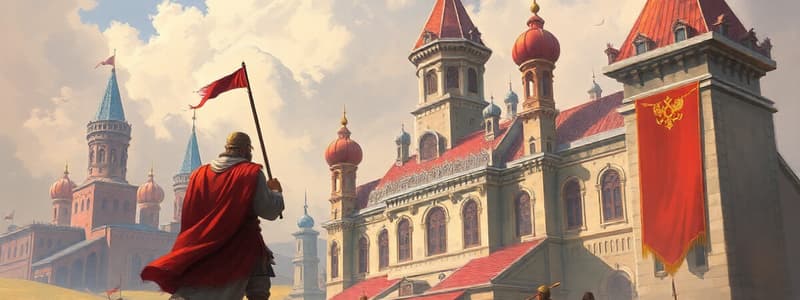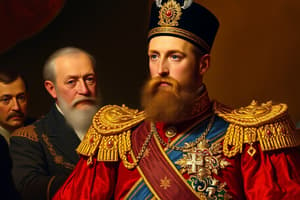Podcast
Questions and Answers
What is the likely origin of the name 'Rus'?
What is the likely origin of the name 'Rus'?
- A Greek word for empire
- A French term for unity
- An Old Slavic term for land
- An Old Norse word meaning 'rowers' (correct)
Who declared himself Tsar of 'All Rus' in the 16th century?
Who declared himself Tsar of 'All Rus' in the 16th century?
- Nicholas II
- Peter the Great
- Catherine the Great
- Ivan IV (correct)
How many members does the State Duma have?
How many members does the State Duma have?
- 500
- 450 (correct)
- 300
- 600
What is the primary role of the president in Russia?
What is the primary role of the president in Russia?
How long is the term for a Russian president?
How long is the term for a Russian president?
Which chamber of the Federal Assembly is the upper house?
Which chamber of the Federal Assembly is the upper house?
What powers does the prime minister have compared to the president?
What powers does the prime minister have compared to the president?
Which body can approve or reject the president's choice for prime minister?
Which body can approve or reject the president's choice for prime minister?
What percentage of the Russian population identifies as Orthodox Christians?
What percentage of the Russian population identifies as Orthodox Christians?
Which region in Russia primarily practices Islam?
Which region in Russia primarily practices Islam?
What is the approximate percentage of Muslims in the Russian population?
What is the approximate percentage of Muslims in the Russian population?
What constitutes the most significant holiday celebrated in Russia?
What constitutes the most significant holiday celebrated in Russia?
What common practice reflects Russian customs around hospitality?
What common practice reflects Russian customs around hospitality?
Which of the following statements best describes the current status of the Russian Orthodox Church?
Which of the following statements best describes the current status of the Russian Orthodox Church?
What percentage of the Russian population adheres to Buddhism?
What percentage of the Russian population adheres to Buddhism?
Which activity is commonly associated with Russians spending time at their dachas?
Which activity is commonly associated with Russians spending time at their dachas?
What is the role of the Federation Council in Russia?
What is the role of the Federation Council in Russia?
Which court in Russia serves as the highest for civil, criminal, and administrative cases?
Which court in Russia serves as the highest for civil, criminal, and administrative cases?
How many federal subjects make up the federation of Russia?
How many federal subjects make up the federation of Russia?
Which political party has dominated the political landscape in Russia for years?
Which political party has dominated the political landscape in Russia for years?
What condition has raised concerns about the fairness of elections in Russia?
What condition has raised concerns about the fairness of elections in Russia?
Which of the following is NOT a type of federal subject in Russia?
Which of the following is NOT a type of federal subject in Russia?
What cultural aspect is highly regarded among Russians?
What cultural aspect is highly regarded among Russians?
What is the largest ethnic group in Russia?
What is the largest ethnic group in Russia?
What is the primary purpose of the banya in Russian culture?
What is the primary purpose of the banya in Russian culture?
Which festival marks the transition from winter to Lent in Russia?
Which festival marks the transition from winter to Lent in Russia?
In Russian culture, which of the following beliefs is considered unlucky?
In Russian culture, which of the following beliefs is considered unlucky?
What is a key characteristic of family values in Russian culture?
What is a key characteristic of family values in Russian culture?
What role do traditional gender roles play in Russian society?
What role do traditional gender roles play in Russian society?
Which of the following is a common superstition in Russian culture?
Which of the following is a common superstition in Russian culture?
Despite the legal rights, what is a significant issue faced by women in Russia?
Despite the legal rights, what is a significant issue faced by women in Russia?
From which tradition do many Russian cultural practices derive?
From which tradition do many Russian cultural practices derive?
What law was passed in 2017 regarding domestic violence?
What law was passed in 2017 regarding domestic violence?
What has been a recent influence on the rise of conservative views on gender in Russia?
What has been a recent influence on the rise of conservative views on gender in Russia?
Which of the following is NOT a focus for feminist activists in Russia?
Which of the following is NOT a focus for feminist activists in Russia?
How do urban women's experiences differ from rural women's experiences in Russia?
How do urban women's experiences differ from rural women's experiences in Russia?
Which of the following is a staple food in Russian cuisine?
Which of the following is a staple food in Russian cuisine?
What is the Bolshoi Theatre in Moscow best known for?
What is the Bolshoi Theatre in Moscow best known for?
What type of dish are pelmeni?
What type of dish are pelmeni?
Which landmark features St. Basil's Cathedral?
Which landmark features St. Basil's Cathedral?
What is a major issue faced by Russia's educational system?
What is a major issue faced by Russia's educational system?
What type of assessments are commonly criticized in Russia's educational system?
What type of assessments are commonly criticized in Russia's educational system?
Which of the following is NOT a domestic strategy that Russia has implemented?
Which of the following is NOT a domestic strategy that Russia has implemented?
What social issue is particularly concerning in Russia's education system?
What social issue is particularly concerning in Russia's education system?
What has been a criticism of the Russian education curriculum?
What has been a criticism of the Russian education curriculum?
In which of the following sectors has Russia focused on import substitution?
In which of the following sectors has Russia focused on import substitution?
What continues to be a problem affecting students' performance in Russian schools?
What continues to be a problem affecting students' performance in Russian schools?
Which strategy is Russia pursuing in response to international dynamics?
Which strategy is Russia pursuing in response to international dynamics?
Flashcards
Origin of Russia's Name
Origin of Russia's Name
The name "Russia" (Rossiya) comes from the medieval state of Kievan Rus', established in the 9th century by Varangians. It's connected to the land's historical development.
Kievan Rus'
Kievan Rus'
The medieval state that existed in the 9th century, encompassing areas that are now Ukraine, Belarus, and parts of western Russia.
Russian President
Russian President
The head of state in Russia, holding significant authority over foreign policy, defense, and appointing the prime minister.
Russian Prime Minister
Russian Prime Minister
Signup and view all the flashcards
State Duma
State Duma
Signup and view all the flashcards
Federal Assembly
Federal Assembly
Signup and view all the flashcards
Executive Branch
Executive Branch
Signup and view all the flashcards
Legislative Branch
Legislative Branch
Signup and view all the flashcards
Largest Religion in Russia
Largest Religion in Russia
Signup and view all the flashcards
Second Largest Religion
Second Largest Religion
Signup and view all the flashcards
Minor Religions (Russia)
Minor Religions (Russia)
Signup and view all the flashcards
Russian Hospitality
Russian Hospitality
Signup and view all the flashcards
Dacha in Russia
Dacha in Russia
Signup and view all the flashcards
Russian New Year Celebration
Russian New Year Celebration
Signup and view all the flashcards
Secular Constitution (Russia)
Secular Constitution (Russia)
Signup and view all the flashcards
Post-Soviet Revival
Post-Soviet Revival
Signup and view all the flashcards
Federation Council
Federation Council
Signup and view all the flashcards
State Duma
State Duma
Signup and view all the flashcards
Constitutional Court (Russia)
Constitutional Court (Russia)
Signup and view all the flashcards
Supreme Court (Russia)
Supreme Court (Russia)
Signup and view all the flashcards
Arbitration Courts
Arbitration Courts
Signup and view all the flashcards
Federal Structure (Russia)
Federal Structure (Russia)
Signup and view all the flashcards
Federal Subjects
Federal Subjects
Signup and view all the flashcards
United Russia Party
United Russia Party
Signup and view all the flashcards
Russian Elections
Russian Elections
Signup and view all the flashcards
Russian Culture
Russian Culture
Signup and view all the flashcards
Russians (people)
Russians (people)
Signup and view all the flashcards
Banya
Banya
Signup and view all the flashcards
Maslenitsa
Maslenitsa
Signup and view all the flashcards
Orthodox Christianity
Orthodox Christianity
Signup and view all the flashcards
Russian Superstitions
Russian Superstitions
Signup and view all the flashcards
Russian Folklore
Russian Folklore
Signup and view all the flashcards
Family Values (Russia)
Family Values (Russia)
Signup and view all the flashcards
Pagan Influences (Russia)
Pagan Influences (Russia)
Signup and view all the flashcards
Traditional Gender Roles (Russia)
Traditional Gender Roles (Russia)
Signup and view all the flashcards
Legal Gender Equality (Russia)
Legal Gender Equality (Russia)
Signup and view all the flashcards
Russian Gender Views
Russian Gender Views
Signup and view all the flashcards
Borscht
Borscht
Signup and view all the flashcards
Pelmeni
Pelmeni
Signup and view all the flashcards
Blini
Blini
Signup and view all the flashcards
Olivier Salad
Olivier Salad
Signup and view all the flashcards
Pirozhki
Pirozhki
Signup and view all the flashcards
Domestic Violence Law (2017)
Domestic Violence Law (2017)
Signup and view all the flashcards
Rise in Conservative Views
Rise in Conservative Views
Signup and view all the flashcards
LGBTQ+ Discrimination
LGBTQ+ Discrimination
Signup and view all the flashcards
Feminist Movement Challenges
Feminist Movement Challenges
Signup and view all the flashcards
Intersectionality in Russia
Intersectionality in Russia
Signup and view all the flashcards
Government Censorship in Russia
Government Censorship in Russia
Signup and view all the flashcards
Russian Education System Funding
Russian Education System Funding
Signup and view all the flashcards
Russian Education Curriculum
Russian Education Curriculum
Signup and view all the flashcards
Russian Teacher Training
Russian Teacher Training
Signup and view all the flashcards
Russian Assessment Methods
Russian Assessment Methods
Signup and view all the flashcards
Russian Education Dropout Rate
Russian Education Dropout Rate
Signup and view all the flashcards
Import Substitution (Russia)
Import Substitution (Russia)
Signup and view all the flashcards
Energy Diversification (Russia)
Energy Diversification (Russia)
Signup and view all the flashcards
Military Build-Up (Russia)
Military Build-Up (Russia)
Signup and view all the flashcards
Russian Social Programs
Russian Social Programs
Signup and view all the flashcards
Russian Alliances
Russian Alliances
Signup and view all the flashcards
Study Notes
Country of Russia
- Russia's name originated from the medieval state of Kievan Rus'
- Founded in the 9th century by Vikings
- The name "Rus" comes from the Old Norse word "roðs", meaning rowers or seafarers
- Kievan Rus' later fragmented into various principalities
- Mongol invasions reshaped the region
- The Grand Duchy of Moscow emerged in the 14th century
- Ivan the Terrible declared himself Tsar of "All Rus" in the 16th century, symbolizing the unified claim to lands
- The name Russia (Rossiya) evolved, continuing the medieval Rus' state
Political Structure
- Executive Branch:
- President is the head of state, holding significant authority
- Responsible for foreign policy, national defense, and appointing the prime minister (with State Duma approval).
- Can issue decrees with the force of law
- Current President: Vladimir Putin (as of 2024)
- Terms: 6 years, can serve two consecutive terms
- Prime Minister:
- Head of government
- Responsible for domestic and economic policy
- Powers are more limited than the president
- Current Prime Minister: Mikhail Mishustin (as of 2024)
- Federal Ministries: Appointed by the prime minister, responsible for various areas like defense, education, and healthcare
- Legislative Branch:
- Bicameral legislature called the Federal Assembly
- Divided into the State Duma (lower house) and Federation Council (upper house)
- State Duma: 450 members, elected for five-year terms; drafts and passes legislation
- Federation Council: 170 members, two representatives from each of Russia's 85 federal subjects (regions/republics). Approves/rejects laws.
- Judicial Branch:
- Constitutional Court: Ensures laws conform to the Russian Constitution
- Supreme Court: Highest court for civil, criminal, and administrative cases
- Arbitration Courts: Handle commercial disputes
- Federal Structure:
- 85 federal subjects, including republics, territories (krais), regions (oblasts), cities of federal significance, autonomous areas, and an autonomous region.
- Republics often have their own constitutions and languages alongside Russian.
Contemporary Culture
- Russian culture is rich in literature, music, ballet, and cinema
- Family, community, and tradition highly valued
- Russian Orthodox Church is the dominant religion (about 70% of population)
- Also significant Muslim, Buddhist, Jewish communities, and other religions
- Strong sense of national pride, resilience, and hospitality
- Deep rooted sense of tradition
- Value family, community, and cultural heritage
- Can be reserved at first, but warm and loyal
- Rich in literature and art, with notable historical events influencing cultural values
Language
- Russia has over 100 languages spoken across vast territory
- Russian is the official language. Spoken by a vast majority
Religion
- Russian Orthodoxy is the predominant faith
- Historical roots in 988 AD
- Influence on Russian culture, traditions, and identity
- Significant role in the country's traditions, arts, and politics
- Islam is the second-largest religion
Customs and Beliefs
- Hospitality: bringing gifts, offering meals
- Dacha: country houses, for weekends and holidays; gardening and outdoor activities
- New Year Celebration: lavish feasts, fireworks
- Banya (Bathhouse): steam bath rituals like cold plunges
- Maslenitsa: week-long festival marking the end of winter and the beginning of Lent, features pancakes (blini), folk games, and effigy burning
Educational System
- General education in Russia consists of four levels:
- Preschool (Дошкольное образование): typically 3–6 years old, play-based learning, social skill development, basic literacy and numeracy.
- Primary Education (Начальное общее образование): 6 or 7-10 years old (Grades 1–4), focused on foundational subjects.
- Basic General Education (Основное общее образование): 10-15 years old (Grades 5–9), broad curriculum.
- Secondary Education (Cреднее общее образование): 15–17 years old (Grades 10–11), preparation for university admission.
- Vocational Education (Среднее профессиональное образование): 15–18 years old (or older), specializing for specific professions.
- Higher Education (Высшее образование): 18+, undergraduate or graduate
Challenges and Current Issues
- Economic Stagnation: Slow growth, reliance on energy exports
- Demographic Crisis: Declining population, low birth rates, increasing life expectancy
- Ukraine War: Severe economic sanctions, diplomatic isolation, massive loss of life
- Western Sanctions: significant impact on Russia's economy, limiting access to markets.
- Energy Dependence: Vulnerable to energy price fluctuations, geopolitical tensions.
- Environmental Issues: Air and water pollution, soil contamination.
- Natural Resource Management: Illegal logging, overexploitation, inadequate waste management
- Nuclear Legacy: Storage and disposal of nuclear waste.
- Russia's View on LGBTQ+ Community: legal restrictions, social stigma
- Social Issues: high dropout rates, bullying and harassment.
- Educational System Issues: underfunding, outdated infrastructure, low teacher salaries, disparities in quality regional differences.
Studying That Suits You
Use AI to generate personalized quizzes and flashcards to suit your learning preferences.





